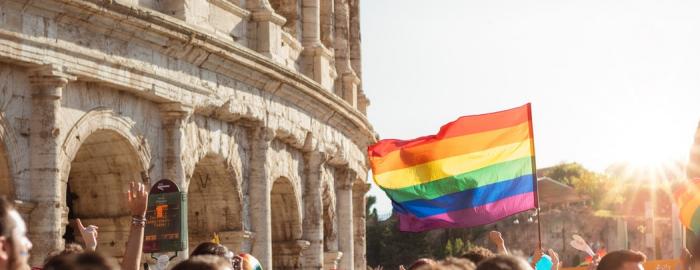Being Gay, Lesbian, Bisexual, or Transgender Abroad
How sexual identities are defined and understood varies between cultures, including the interpretation of what is considered appropriate behavior. This applies to acquaintances as well as platonic and intimate relationships. If you are an LGBTQIA+ student, it is important to understand that openly living your sexual orientation and/or gender identity abroad might be different from what you are accustomed to at home. Some countries and cultures are open to LGBTQIA+ individuals while others are less accepting or even hostile. Attitudes toward sexual orientation and gender non-conformity can vary significantly even within regions of the same country or according to different social contexts.
Expression of Gender, Sexual Orientation, Relationships, and Safety
A foreign country may appear to provide a safe haven for exploring sexual and gender identities free from the judgments of friends and family. Unfortunately, students sometimes learn that what originally appeared to be a safe environment was not safe at all. While some countries are more supportive of LGBTQIA+ rights than the United States, others stipulate punishments for same-sex sexual behavior and behaviors that transgress local gender norms. A new and potentially challenging environment does not necessarily mean you will have a negative experience abroad as long as you properly prepare yourself to navigate the local culture. Before you go abroad, research LGBTQIA+ rights and local laws in your future host country and other places you plan to travel. Become informed so you can have a safe and rewarding experience abroad.
Questions to Consider
- What are the laws regarding homosexuality in the host country?
- Is it safe for me to be out when I am abroad?
- Should I come out to my host family and peers on my program?
- Is there flexibility in the accommodations, if I need a single room and private bath?
- What LGBTQIA+ resources exist in my host country?
- What is the LGBTQIA+ population like in my host country?
- What are the cultural norms for dating and friendship?
- Who can I turn to, either in my program abroad or back at Duke, if I need support?
- What is considered appropriate behavior for male and female students in the different contexts I will find myself in? How flexible are local gender norms?
- For trans* students: Will I have issues with my passport and visa while traveling? Will I require access to any medications or services while abroad? If so, will I need special documentation to transport them to or to acquire them in my host country?
Tips for LGBTQIA+ Students Traveling Abroad
You may refer to the links below for more information, and do not hesitate to contact the Global Education Office for more specifics regarding your program location. Definitely reach out to other students who have travelled to your destination(s). For e-mail contacts of Duke students who have previously studied abroad, you may consult our student contact lists.
Below are some tips to keep in mind as you begin to prepare for your time abroad:
- Look for LGBTQIA+ community resources where you will be living/travelling.
- Before you go abroad, familiarize yourself with the customs and laws of your host country.
- Research the terms and definitions used in your host country to talk about LGBTQIA+ issues.
- Have a conversation with a study abroad advisor in the Global Education Office about your concerns, and to develop a strategy to have as positive an experience abroad as possible. Our advisors have received Ally training, and would love to help guide you.
- Talk to the faculty director of your program about any concerns before or during your program as needed.
- Always put your safety first.
More Resources
General
- Duke University Center for Gender and Sexual Diversity (CSGD)
- The NAFSA Rainbow Special Interest Group
- Meaningful Travel Tips & Tales: LGBTQ Travelers' Perspectives from GoAbroad.com
- Michigan State University: Sexuality and Gender Identity Resources
Country Specific
Scholarships
Trans Specific
- http://www.transequality.org/
- https://www.tsa.gov/transgender-passengers
- Schroth, L. (2014). Trans bodies, trans selves: a resource for the transgender community. Oxford: Oxford University Press. (Available at Duke CSGD)




